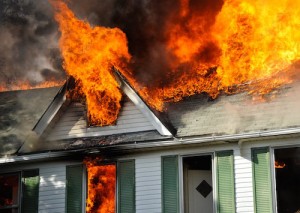Fire Safety Fundamentals: More than Stop, Drop and Roll
Posted March 29th, 2016 by Anthony Carbone, PC.
Categories: Personal Injury.
 Ask any first grader about fire safety and they’ll likely repeat one key phrase. Stop, drop and roll. After all, it’s what the firefighter told the class during his visit with them. In years to come, it may be the only thing the child remembers about fire safety.
Ask any first grader about fire safety and they’ll likely repeat one key phrase. Stop, drop and roll. After all, it’s what the firefighter told the class during his visit with them. In years to come, it may be the only thing the child remembers about fire safety.
Sadly, stop, drop and roll can get you killed. Learn why.
While her family went out to dinner, sixteen year old Molly stayed home to do homework. Suddenly, she smelled smoke. Molly started to cough as the smoke alarm shrieked. She remembered she needed to stop, drop and roll. Too bad Molly forgot another key phrase: Stay low and go. When a room is filled with smoke, the safest place is the floor. It’s best to get down and crawl to safety.
Convinced you may have forgotten some fire safety fundamentals? Many adults are unsure what they need to do in case of a fire. Let’s go over the basics:
1. What Does Stop, Drop and Roll Really Mean?
The National Fire Prevention Association is the premier provider of fire safety education. In this lesson, they establish the guidelines for stop, drop and roll: Stop, drop and roll is used when someone’s clothes are on fire. When your clothes have caught fire, you will increase the likelihood that the fire will gain more strength. When you drop to the ground, make sure to cover your face. The fire will lose oxygen when you move to the floor. You can actually smother the fire by rolling like a log.
2. Stay Low and Go – When a Room is Consumed by Smoke
We told you about Molly’s situation earlier. Not sure when to stay low and go? Anytime a building is on fire, stay low and go and head to the nearest exit. Before you open a door, there are other important precautions you need to keep in mind.
3. Concerns about Doors that Feel Hot
Before you open any door, check its temperature. Don’t make a grab for the doorknob. Most doorknobs are made of metal and can cause serious burn injuries. If the door is hot, don’t open it. Look for billows of smoke at the top. Smoke rises. If you aren’t overcome by smoke or fire, try to leave the room. Remember to stay, low and go.
4. Putting out Fires
Do you have firefighting training? Do you have a fire extinguisher on hand? Do you know that different fires react differently? For example, do you know the serious danger of attempting to put out a grease fire with water? You can be faced with a huge explosion in your face. Check out this news video demonstrating the perils of attempting to stop a kitchen fire with water:
You might think it’s dumb. Fires often leave unseen embers. You might think you did a good job extinguishing a fire. Frankly, you most likely lack the expertise. Call for emergency services. Let the fire department do a safety inspection.
Your life. Your family’s wellbeing. Your pet. Your personal and real property. Get professional help to determine no hidden dangers remain.
We Want to Help You
Despite every precaution, you may become the victim of a fire accident. Fires account for many serious injuries. Some fires take lives.
If you or a loved one has become involved in a fire, contact the Law Offices of Anthony Carbone. We have extensive experience in dealing with those who have suffered harm as a result of an accidental fire. We can help you determine if you have a cause of action.
Need help? Contact us for a complimentary appointment.


